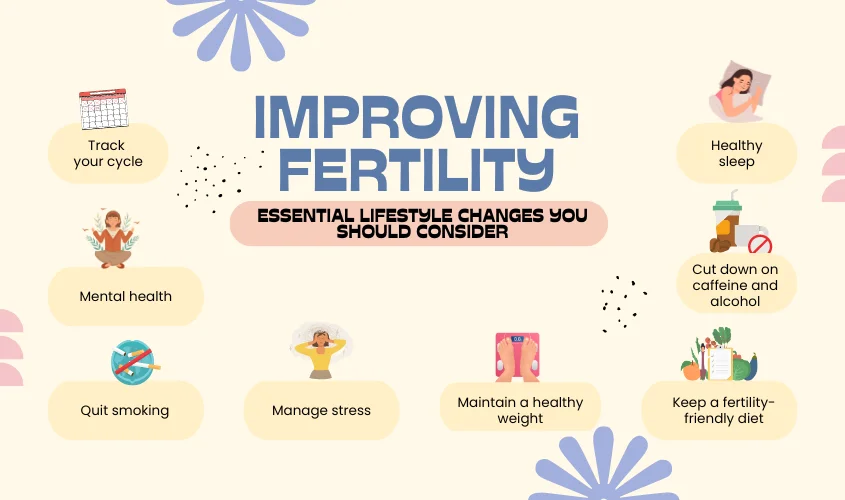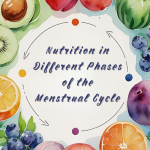
- 08.10.2024
- Planning for Pregnancy
Improving Fertility
When it comes to improving fertility, many factors can play a significant role, from medical conditions to lifestyle choices. This article explores several lifestyle changes that can help enhance fertility and increase the chances of conception.
Understanding Fertility
Fertility refers to the ability to conceive and carry a pregnancy to term. Various factors can affect fertility, including age, weight, medical conditions, and lifestyle choices. For those trying to conceive, understanding how to improve fertility through lifestyle changes is crucial.
1. Maintain a Healthy Weight
One of the most significant lifestyle changes you can make is to maintain a healthy weight. Studies show that being underweight or overweight can negatively affect fertility in both men and women.
Women
For women, being overweight can lead to hormonal imbalances, irregular menstrual cycles, and anovulation (the absence of ovulation). Conversely, being underweight can also lead to irregular periods and hormone fluctuations.
Men
In men, obesity can affect sperm production and quality, leading to decreased fertility.
Tips for Maintaining a Healthy Weight
- Balanced Diet: Focus on a diet rich in whole grains, fruits, vegetables, lean proteins, and healthy fats.
- Regular Exercise: Aim for at least 150 minutes of moderate exercise each week.
2. Eat a Fertility-Friendly Diet
A well-balanced diet plays a crucial role in improving fertility. Certain foods can enhance reproductive health and overall well-being.
Key Nutrients for Improving Fertility:
- Folic Acid: Essential for DNA synthesis and cell division, folic acid is vital for women trying to conceive. Foods rich in folate include leafy greens, beans, and fortified cereals.
- Omega-3 Fatty Acids: Found in fatty fish like salmon, walnuts, and flaxseeds, omega-3s can improve egg quality and support overall hormonal balance.
- Antioxidants: Foods rich in antioxidants, such as berries, nuts, and dark chocolate, can help reduce oxidative stress and improve fertility.
3. Manage Stress
Chronic stress can impact fertility by disrupting hormonal balance. Finding ways to manage stress is essential for those trying to conceive.
Techniques for Stress Management
- Mindfulness and Meditation: Practicing mindfulness and meditation can help reduce anxiety and improve overall well-being.
- Yoga: Yoga promotes relaxation and has been shown to improve reproductive health.
- Therapy: Speaking with a mental health professional can provide coping strategies and emotional support.
4. Limit Alcohol and Caffeine Intake
Both alcohol and caffeine can negatively impact fertility. Limiting their intake can be beneficial.
Alcohol
High alcohol consumption has been linked to decreased fertility in both men and women. It’s advisable to limit alcohol intake or avoid it altogether when trying to conceive.
Caffeine
Some studies suggest that excessive caffeine intake may affect fertility. Consider reducing caffeine consumption to under 200 mg per day (about one 12-ounce cup of coffee).
5. Quit Smoking
Smoking has been shown to adversely affect fertility in both men and women. For women, smoking can lead to problems with fallopian tubes and the ovaries. For men, smoking can negatively impact sperm quality.
Quitting smoking can significantly improve fertility and overall health.
6. Track Your Cycle
Understanding your menstrual cycle and ovulation patterns can enhance your chances of conception. The Selin app is a helpful tool for tracking menstrual cycles and ovulation, providing insights into your reproductive health.
Benefits of Tracking Your Cycle:
- Identify Fertile Days: By tracking your cycle, you can pinpoint your ovulation window, increasing your chances of conception.
- Monitor Symptoms: Keeping track of symptoms can help you understand your body better and identify any irregularities.
Conclusion
Making lifestyle changes can significantly impact your fertility and increase your chances of conception. Maintaining a healthy weight, eating a balanced diet, managing stress, limiting alcohol and caffeine, quitting smoking, and tracking your cycle are all essential steps to improve fertility.
For personalized support and tools, consider using the Selin app to help you on your journey toward improving fertility.
For additional tips and insights, check out our Planning for Pregnancy section.














